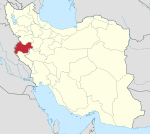Tut Shami
Tut Shami Persian: توتشامي | |
|---|---|
Village | |
| Coordinates: 34°21′48″N 46°20′06″E / 34.36333°N 46.33500°E[1] | |
| Country | Iran |
| Province | Kermanshah |
| County | Dalahu |
| District | Gahvareh |
| Rural District | Gurani |
| Population (2016)[2] | |
• Total | 312 |
| Time zone | UTC+3:30 (IRST) |
Tut Shami (Persian: توتشامي)[a] is a village in Gurani Rural District of Gahvareh District, Dalahu County, Kermanshah province, Iran.
Demographics
Ethnicity
Tut Shami is important to the Yarsani religion as it is the residence of the Haydarî family, one of the leading spiritual leaders or sayyeds of the Goran Kurds.[4]
Population
At the time of the 2006 National Census, the village's population was 318 in 79 households.[5] The following census in 2011 counted 296 people in 86 households.[6] The 2016 census measured the population of the village as 312 people in 85 households. It was the most populous village in its rural district.[2]
See also
Notes
References
- ^ OpenStreetMap contributors (11 December 2024). "Tut Shami, Dalahu County" (Map). OpenStreetMap (in Persian). Retrieved 11 December 2024.
- ^ a b Census of the Islamic Republic of Iran, 1395 (2016): Kermanshah Province. amar.org.ir (Report) (in Persian). The Statistical Center of Iran. Archived from the original (Excel) on 3 April 2022. Retrieved 19 December 2022.
- ^ Tut Shami can be found at GEOnet Names Server, at this link, by opening the Advanced Search box, entering "-3087891" in the "Unique Feature Id" form, and clicking on "Search Database".
- ^ "Three representations of Satan in Aht-E Haqq cosmology" (PDF). p. 5. Archived from the original (PDF) on 15 December 2017.
- ^ Census of the Islamic Republic of Iran, 1385 (2006): Kermanshah Province. amar.org.ir (Report) (in Persian). The Statistical Center of Iran. Archived from the original (Excel) on 20 September 2011. Retrieved 25 September 2022.
- ^ Census of the Islamic Republic of Iran, 1390 (2011): Kermanshah Province. irandataportal.syr.edu (Report) (in Persian). The Statistical Center of Iran. Archived from the original (Excel) on 18 January 2023. Retrieved 19 December 2022 – via Iran Data Portal, Syracuse University.


